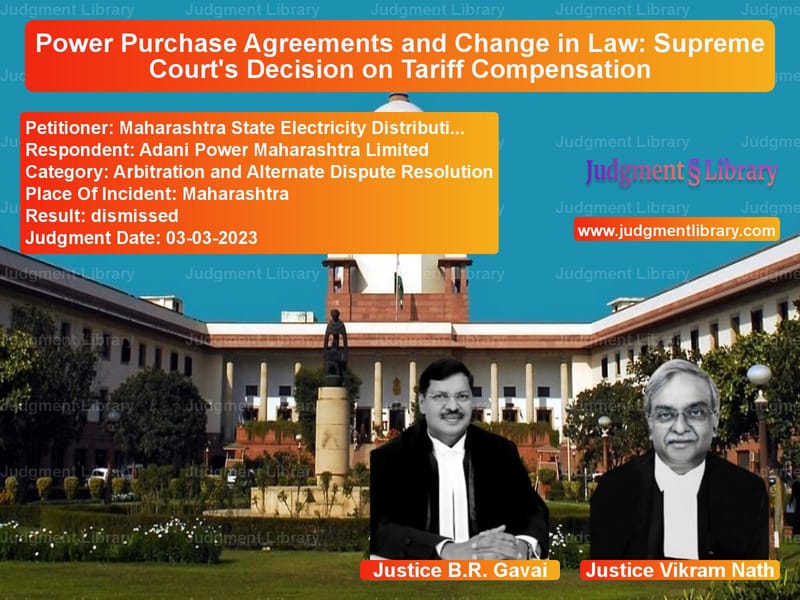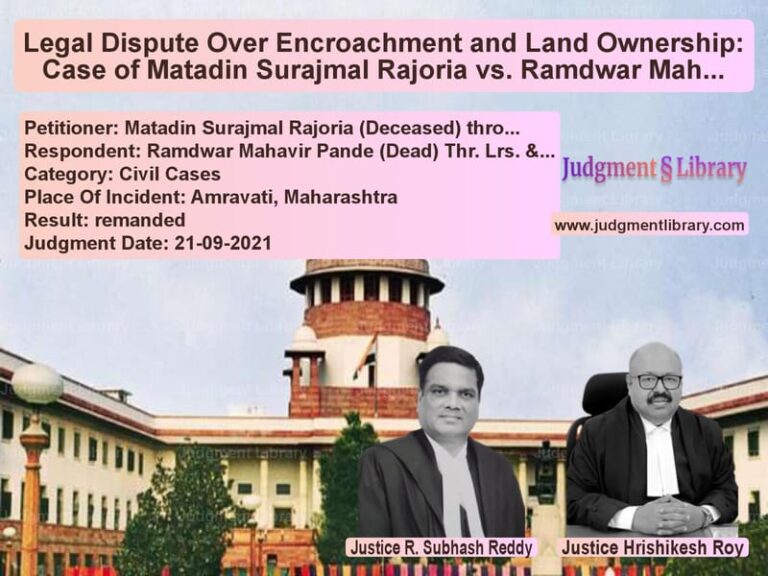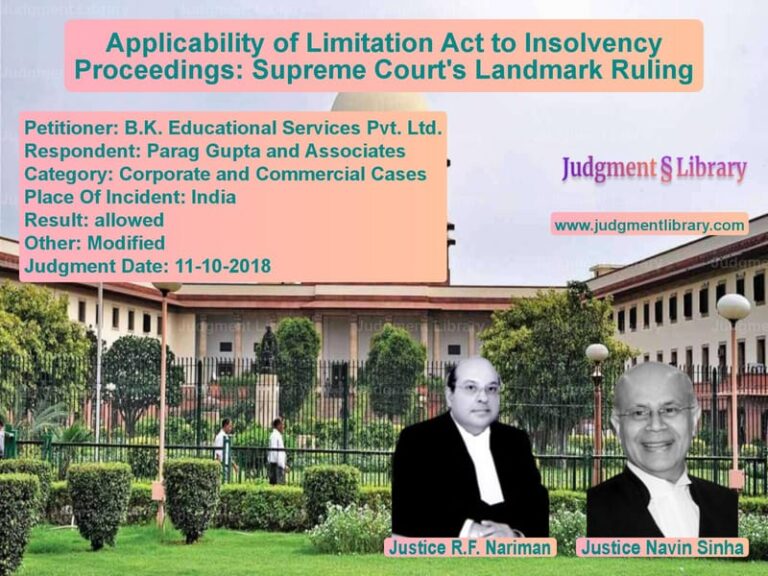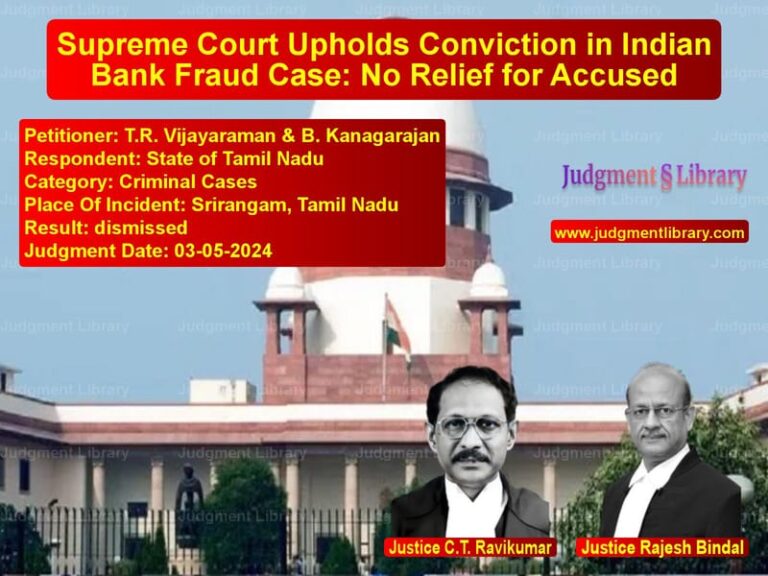Power Purchase Agreements and Change in Law: Supreme Court’s Decision on Tariff Compensation
The case of Maharashtra State Electricity Distribution Company Limited (MSEDCL) v. Adani Power Maharashtra Limited revolves around the interpretation of the ‘Change in Law’ clause in Power Purchase Agreements (PPAs). The dispute arises from a policy change affecting coal supply, leading to increased fuel costs for power producers. The Supreme Court was tasked with determining whether Adani Power was entitled to compensation under the PPA due to the revised New Coal Distribution Policy (NCDP), 2013, which reduced coal supply commitments from Coal India Limited (CIL). The ruling sets a precedent for how changes in government policies impact power sector contracts.
Background of the Case
MSEDCL entered into multiple PPAs with Adani Power under a competitive bidding process in 2008 for the procurement of electricity. These agreements were executed based on certain assumptions, including the availability of domestic coal at prices regulated by the government. However, after the enactment of the New Coal Distribution Policy (NCDP), 2013, CIL reduced the coal supply allocations, requiring power producers to procure expensive imported coal to meet their fuel needs. Adani Power sought compensation under the ‘Change in Law’ clause, arguing that the policy revision substantially increased operational costs.
Key Issues Before the Court
- Whether the revision of the NCDP, 2013, constituted a ‘Change in Law’ event under the PPA.
- Whether Adani Power was entitled to compensation for increased fuel costs due to a reduction in domestic coal supply.
- The methodology for determining compensation and whether it should be based on actual parameters like Station Heat Rate (SHR) and Gross Calorific Value (GCV).
- Applicability of past Supreme Court rulings, including Energy Watchdog v. CERC and Adani Rajasthan.
Arguments by the Petitioner (MSEDCL)
- MSEDCL argued that the risks associated with coal procurement, including changes in coal supply policy, were already factored into the bid price submitted by Adani Power.
- The competitive bidding framework under the Electricity Act, 2003, was designed to ensure fixed tariffs, and allowing compensation for coal price increases would undermine the bidding process.
- Imported coal should not be considered under ‘Change in Law’ compensation since the PPAs were executed with an expectation of domestic coal supply.
- The methodology for computing compensation should rely on bid parameters rather than actuals like SHR and GCV.
Arguments by the Respondent (Adani Power)
- Adani Power contended that the government’s decision to reduce domestic coal supply under the NCDP, 2013, was a regulatory action beyond its control, qualifying as a ‘Change in Law’ event.
- The restitution principle required the affected party to be compensated to restore the economic balance of the contract.
- The compensation should be based on actual operational parameters, such as actual SHR and GCV, rather than the bid assumptions.
- Supreme Court rulings in Energy Watchdog and Adani Rajasthan supported claims for tariff adjustments in cases of unforeseen regulatory changes.
Supreme Court’s Analysis and Findings
The Supreme Court extensively examined the regulatory framework governing power procurement and the significance of the ‘Change in Law’ provision under the PPA.
Definition and Scope of ‘Change in Law’
The Court reiterated the principles established in past judgments, emphasizing that a policy change by the government that significantly impacts contractual obligations can qualify as a ‘Change in Law.’ The Court observed:
“The NCDP, 2007, had assured a certain level of coal supply. The subsequent NCDP, 2013, which reduced the supply commitment, constitutes a Change in Law event, as it was a decision of the government affecting the terms of supply.”
Restitution and Compensation Principle
The Supreme Court upheld the principle that any financial burden arising due to a ‘Change in Law’ must be compensated to maintain the economic equilibrium of the contract. The Court cited:
“The PPA mandates that in the event of a Change in Law, the affected party should be compensated such that it is placed in the same economic position as it would have been had the law not changed.”
Determination of Compensation
- The Court held that the compensation should be calculated based on actual operating parameters, ensuring a fair and just recovery of increased costs.
- It dismissed MSEDCL’s argument that bid parameters should be used, stating that bid assumptions do not reflect real-time variations in operational costs.
- The Court directed the regulatory authority to determine the final compensation amount by considering actual SHR and GCV values.
Final Judgment
- The Supreme Court upheld the findings of the Central Electricity Regulatory Commission (CERC) and the Appellate Tribunal for Electricity (APTEL), affirming that Adani Power was entitled to compensation.
- MSEDCL’s appeal was dismissed, and it was directed to compensate Adani Power per the methodology prescribed by the CERC.
- Late payment surcharges were upheld as per the terms of the PPA.
Impact of the Judgment
The ruling has far-reaching implications for the power sector, particularly regarding the sanctity of long-term contracts and the treatment of regulatory changes.
- Strengthens contractual stability: Reinforces the principle that contracts should be honored despite regulatory shifts.
- Clarifies compensation framework: Establishes that restitution under ‘Change in Law’ must reflect actual cost increases rather than bid assumptions.
- Provides regulatory certainty: Offers clarity on how power producers should approach unforeseen changes in government policies.
- Ensures investor confidence: Encourages investment in power projects by guaranteeing that legitimate regulatory costs will be recoverable.
Conclusion
The Supreme Court’s decision in MSEDCL v. Adani Power underscores the importance of contractual integrity and regulatory certainty in power sector agreements. By upholding the compensation claim under the ‘Change in Law’ clause, the ruling ensures that power producers are protected from unforeseen regulatory burdens, thereby promoting stability and fairness in the sector.
Petitioner Name: Maharashtra State Electricity Distribution Company Limited.Respondent Name: Adani Power Maharashtra Limited.Judgment By: Justice B.R. Gavai, Justice Vikram Nath.Place Of Incident: Maharashtra.Judgment Date: 03-03-2023.
Don’t miss out on the full details! Download the complete judgment in PDF format below and gain valuable insights instantly!
Download Judgment: maharashtra-state-el-vs-adani-power-maharash-supreme-court-of-india-judgment-dated-03-03-2023.pdf
Directly Download Judgment: Directly download this Judgment
See all petitions in Arbitration Awards
See all petitions in Dispute Resolution Mechanisms
See all petitions in Enforcement of Awards
See all petitions in Settlement Agreements
See all petitions in Institutional Arbitration
See all petitions in Judgment by B R Gavai
See all petitions in Judgment by Vikram Nath
See all petitions in dismissed
See all petitions in supreme court of India judgments March 2023
See all petitions in 2023 judgments
See all posts in Arbitration and Alternate Dispute Resolution Category
See all allowed petitions in Arbitration and Alternate Dispute Resolution Category
See all Dismissed petitions in Arbitration and Alternate Dispute Resolution Category
See all partially allowed petitions in Arbitration and Alternate Dispute Resolution Category







